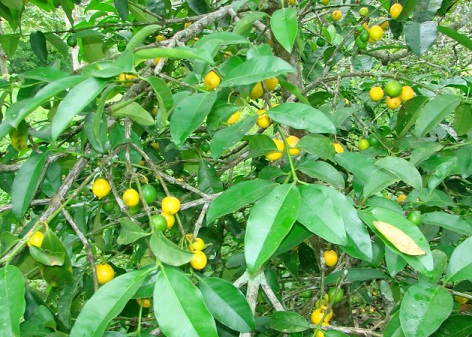Nikhil Prasad Fact checked by:Thailand Medical News Team Dec 29, 2024 3 months, 2 weeks, 23 hours, 42 minutes ago
Medical News:
A Brazilian Medicinal Plant Sparks New Hope
Researchers from leading institutions in Brazil and Portugal have conducted an in-depth study on the therapeutic potential of Garcinia brasiliensis, a plant known locally as Bacupari. The findings provide compelling evidence that extracts from its leaves can inhibit the growth of Ehrlich tumors, a model often used to study cancer. The investigation was carried out by teams from the Federal University of São Paulo, São Paulo State University, Padre Albino University Center, and the University of Aveiro.
 Garcinia Brasiliensis Leaf Extracts Show Promise in Tumor Treatment
Garcinia Brasiliensis Leaf Extracts Show Promise in Tumor Treatment
This
Medical News report explores how the crude extract (CE) and ethyl acetate fraction (EAF) of Garcinia brasiliensis leaves exhibited remarkable antitumor properties. The study included a wide array of analyses ranging from biochemical profiling to histological examinations, offering a comprehensive view of the plant's medicinal capabilities.
The Background of Ehrlich Tumors and Cancer Research
Cancer, one of the leading causes of death worldwide, poses a major challenge for researchers aiming to develop therapies that are both effective and safe. Ehrlich tumors, derived from mouse breast adenocarcinoma cells, are a commonly used model for testing cancer treatments due to their similarity to undifferentiated and fast-growing human tumors. These tumors manifest in two forms: ascitic, where fluid accumulates in the abdomen, and solid, where a localized mass develops under the skin.
The quest for better cancer treatments often involves exploring natural sources for bioactive compounds. In Brazil, medicinal plants like Garcinia brasiliensis have long been used in traditional medicine. Previous studies have highlighted its anti-inflammatory, antimicrobial, and antioxidant properties, but its potential as an anticancer agent remained underexplored - until now.
Study Methodology
The researchers focused on the crude extract (CE) and ethyl acetate fraction (EAF) derived from Garcinia brasiliensis leaves. These were tested at a 10% concentration for their effects on Ehrlich tumors in mice. The study involved both induced (tumor-bearing) and non-induced animals. Over 7 to 14 days, the researchers monitored tumor growth, analyzed biochemical markers, and examined histological samples.
Key compounds in the extracts, such as flavonoids and phenolic compounds, were quantified. High concentrations of these antioxidants - known for their ability to neutralize free radicals - suggested potential for combating cancer. The extracts were also tested for cytotoxicity, ensuring they were safe for use in therapeutic doses.
Promising Findings from the Research
-Tumor Growth Inhibition
Both CE and EAF treatments demonstrated significant antitumor effects. In the ascitic model, reductions in abdominal circumference and ascitic fluid volume were observed. Tumor cells in
the fluid were significantly reduced, indicating the extracts' effectiveness in curbing tumor proliferation.
In the solid tumor model, the treatments reduced both the major and minor diameters of the tumor masses. CE achieved a 50% tumor growth inhibition rate, while EAF exhibited a 35.7% inhibition rate, classified as high and moderate, respectively. These results are encouraging for further studies and clinical applications.
-Biochemical Markers and Safety
Biochemical analyses showed that CE and EAF treatments helped normalize levels of key enzymes such as alanine aminotransferase (ALT), aspartate aminotransferase (AST), and gamma glutamyl transferase (Gamma GT), which are often elevated in tumor-bearing animals. Importantly, these findings highlight the extracts' low toxicity, as confirmed by hemolysis assays and other safety evaluations.
-Histopathological Insights
Microscopic examinations revealed that treated tumors exhibited extensive necrotic regions, indicative of tumor cell death. These areas were characterized by apoptosis (programmed cell death), supported by increased levels of pro-apoptotic markers such as Bax protein. This pro-apoptotic effect underscores the extracts' potential to directly target and destroy cancer cells.
The Role of Inflammation and Immunity
The study also shed light on the interplay between inflammation and tumor progression. Inflammation, often a double-edged sword in cancer, was modulated by the extracts. Levels of interleukin-6 (IL-6) and tumor necrosis factor-alpha (TNF-α) were effectively regulated, reducing inflammatory responses linked to tumor growth.
Interestingly, the presence of mast cells - immune cells involved in inflammation - was significantly reduced in treated tumors. This suggests that the extracts may modulate the tumor microenvironment to suppress cancer progression. Reduced expression of Mast Cell Protease-6 (Mcpt6) further confirmed this anti-inflammatory action.
Conclusions and Future Directions
This groundbreaking study offers compelling evidence that Garcinia brasiliensis leaf extracts have potent antitumor properties. By inhibiting tumor growth, inducing apoptosis, and modulating inflammatory pathways, the crude extract and ethyl acetate fraction of Garcinia brasiliensis emerge as promising candidates for cancer therapy. Their low toxicity profile further strengthens their case as viable options for further development.
The findings pave the way for additional studies to isolate and characterize specific bioactive compounds responsible for these effects. Future research could also explore the efficacy of these extracts in combination with existing cancer therapies, potentially enhancing treatment outcomes.
The study findings were published in the peer-reviewed journal: Pharmaceuticals.
https://www.mdpi.com/1424-8247/18/1/24
For the latest Cancer News, keep on logging to Thailand
Medical News.
Read Also:
https://www.thailandmedical.news/news/brazilian-researchers-expound-on-pomolic-acid-s-cancer-fighting-potential
https://www.thailandmedical.news/news/new-findings-reveal-potent-anti-inflammatory-and-cancer-fighting-compounds-from-a-mediterranean-herb
https://www.thailandmedical.news/articles/herbs-and-phytochemicals
https://www.thailandmedical.news/articles/cancer
